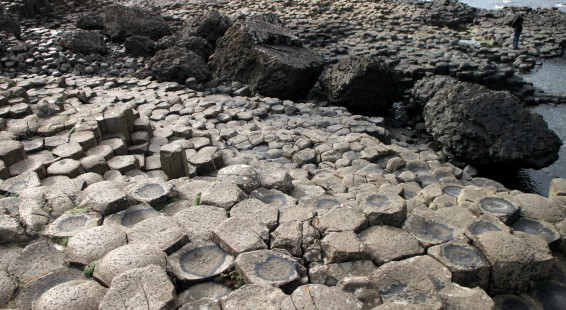
How can you resist visiting a geologic formation created by giants? I couldn’t! Situated on a five mile stretch of Northern Ireland’s rugged Antrim coast, the Giant’s Causeway is well worth going out of your way to see. In fact, visiting it was the main reason we came to Northern Ireland on this trip.
The Causeway is comprised of an interlacing honeycomb of some 40,000 basalt columns of varying heights, mostly of hexagonal-shape but some pieces being five and seven-sided. These columns are arranged in a stair-like fashion that’s fun to walk on and explore.
Geologists tell us these columns are due to ancient volcanic eruptions some 60 million years ago, with lava cooling under the right conditions resulting in the formation of these hexagonal basalt columns; millions of years of erosion causing the puzzle shaped formation you see today. Irish tradition, in its usual colorful fashion, has it that the Causeway is what remains of a bridge that was built by local giant, Finn MacCool, to gain access to his enemy, a Scottish giant living on the island of Staffa. A fun cartoon video of the Irish myth of origin plays at the visitor center, and you can also see it here on this YouTube link if you’d like to know more about this story.

First view of Giant’s Causeway
The Giant’s Causeway is a major tourist attraction and has been since the 18th century. It was declared as Ireland’s first UNESCO World Heritage site in 1986, and is owned and managed by the UK’s National Trust. Your visit begins at a modern and elegantly crafted Visitor Center, set into a hill in a most unobtrusive manner. This is a good place to start your visit to the Causeway. There are some interesting displays (some interactive) worth studying before you descend to the sea: a 3-D mock-up of the Causeway, and several useful films. And, of course, the Visitor’s center has the expected tourist services of coffee and gift shops, informational center, washrooms, etc.
You have the option of taking a small bus directly to the Causeway (1 Euro fee each way), but the walk is downhill and with lovely scenery so if you’re able, I’d certainly recommend you walk to the Causeway. Just be prepared for the cold winds of the coast. Audio-guides are provided and give an excellent background to all you see along the way.

Walking on the Giant’s Causeway
The preserved coastal area stretches some distance but you’ll soon see the rock formations that are part of the Giant’s bridge, the key attraction on the coast. This is where you’ll want to spend your time exploring. Of course, do so with caution. Rocks can be slippery if wet and unpredictable waves are always a possibility. But it’s fun to spend an hour hoping around the formation.
You can return via the small bus, or while harder work, I’d recommend ascending the hill up the Shepherd’s Stair which takes you past the Giant’s Pipe Organ, some especially huge basalt pillars that from a distance mimic the large pipes of a church organ. And from the top of the hill you can enjoy the rugged coast surrounding the causeway Causeway itself, you’ll be treated to some wonderful views of the Causeway and to the south lovely pastoral scenery.
Count on a full half day to see the Causeway and explore the Visitor Center and coast around the area. Well worthwhile!!
(Click on thumbnails to enlarge, right arrow to advance slideshow)

































